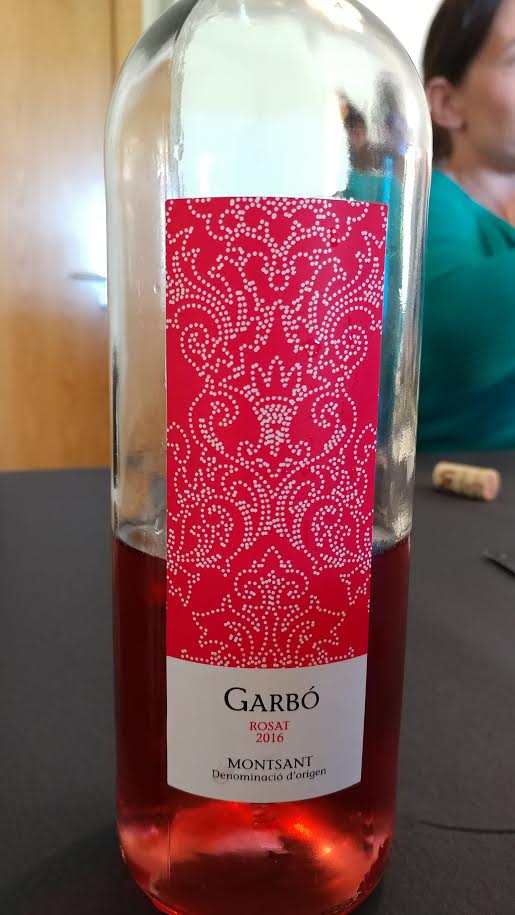The turquoise blue of the winemaker’s sweater was a colorful contrast to the barren, rocky foreground of the vineyards in Priorat, Spain. In this area, remarkably, the grape vines and the few occasional shrubs are able to survive off of the low rainfall and intense heat during the summer, 104F (40C). Also, this area just happens to be one of the greatest wine areas in Spain.
But the extremes of Priorat go beyond that… it has intense swings in temperatures from day to night, the winter will get temperatures as low as 20F (-6C)… my visit just happened to take place during an extreme cold spell in Europe and unfortunately many vineyards were destroyed. But Priorat was still holding on after the previous night’s frost, we could even see the smoke that remained of the fires that vineyard owners were setting to warm their vineyards during the night. This was truly extreme viticulture, with many of the vineyards planted on terraced slopes of legendary, predominately slate soil. How does one grow anything on this land, let alone some of the most powerful, outstanding red wines in Spain? Even further, how does one transition into organic farming in such a hostile environment and keep quality at such a superlative level?

Morlanda
I was visiting with Judit Llop, winemaker for the Priorat winery Morlanda. As I stood there in front of her vines, she started to tell the story of why she is obsessed with probiotics – microorganisms introduced to benefit living things. Six years ago, she was going through an intense time in her life – raising two small children and starting an MBA – one day, she found her body covered in hives. She went to the doctor and he told Judit that her immune system was not working properly because she had neglected herself… she needed to recover her immune system. After some research, she started to take probiotics to revitalize her body to replace the natural microorganisms she had lost through years of mental and physical stress. Through time, her immune system became strong, the hives went away and she started to feel healthier and happier than ever before… she became a believer in not only using probiotics on herself and her kids, but also her vines.

Nourishing What We’ve Lost
Judit said the biggest problem with a vineyard’s conversion to organic, especially in such extreme climatic conditions, is the idea that the vines’ own natural defenses have been killed off by several years of pesticide treatments, so there is always a decline in quality when a vineyard is forced into 100% organic overnight. Judit has been ordering probiotics for her vineyards from the SCD Probiotics company in Kansas City, to help restore the vines’ immune system with microflora and microfauna similar to what they lost – but with the assurance that it will not introduce any harmful substances since it is coming from an award winning, respectable company.
It has taken a few years but finally, last year, she could see that the vines were improving. They were becoming stronger, no longer dependent on chemicals to protect them. They would soon become strong enough on their own, so they could transition to 100% organic farming while still being able to produce the excellent wines that are expected from this area. As she made clear from the beginning, she did not want to convert to organics if the quality would suffer – and to her this was the only way, through these expensive probiotics that would enliven that precious vitality that was once there.

Sometimes we get so consumed with what we need to achieve in life: deadlines, excelling, being everything to everybody, making sure we are contributing… that we end up depleting the most important aspect of ourselves that shines brighter than any star – our inner light. But the good news is that it is never too late to rekindle that inner light… we just need to give ourselves permission to allow our light to be a priority.
Cathrine’s Recommendations
Everyday Drinking Wine (less than $15)
2016 Garbó Rosé, Monstant DO, Spain ($14.99): 100% Garnacha. The Morlanda “Garbó” wines are more fruit driven in nature yet are still rooted in an expression of minerality and come from vineyards in the Montsant which nearly encircles the Priorat region. Delicious flavors of cherry blossom and wild raspberries with a bright acidity on the finish.
Special Occasion Wine (from $15 to $50)
2015 Morlanda, Mas de Subira, Priorat DOQ, Spain ($30): 50% Garnacha and 50% Cariñena. Opaque color with deep-seeded flavors of black cherry compote, lavender and Mediterranean herbs with imperceptible oak and plush body that has plenty of vitality on the finish. Incredibly outstanding wine, especially considering the price!
Fantasy Wine (over $50)
2013 Clos Mogador, Priorat DOQ, Spain ($80): Blend of Garnacha and Cariñena with a small amount of Syrah and Cabernet Sauvignon. Clos Mogador is a well-established Priorat producer that is highly sought after by wine connoisseurs who appreciate big, robust wines that are elegantly polished. Also, it is a certified organic producer. Layers of complexity with notes of graphite, black currant jam and truffle with an impeccable balance that is astoundingly graceful for such an opulent wine.












